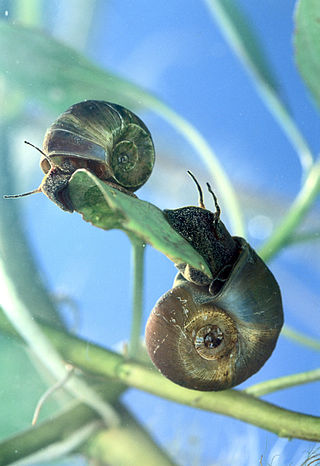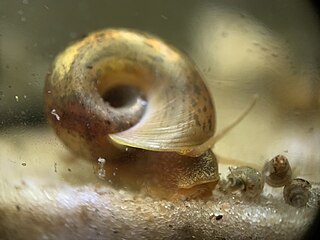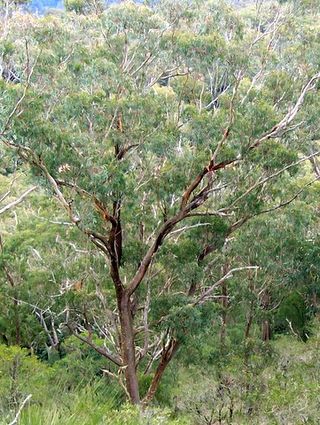
Spathodea is a genus in the plant family Bignoniaceae. The single species it contains, Spathodea campanulata, is commonly known as the African tulip tree. The tree grows between 7–25 m (23–82 ft) tall and is native to tropical dry forests of Africa. It has been nominated as among 100 of the "World's Worst" invaders.

Nepenthes campanulata, the bell-shaped pitcher-plant, is a tropical pitcher plant native to Borneo. It has also been reported from Palawan, the Philippines, though further field work is needed to confirm this identification.

Planorbis is a genus of air-breathing freshwater snails, aquatic pulmonate gastropod mollusks in the family Planorbidae, the ram's horn snails, or planorbids. All species in this genus have sinistral or left-coiling shells.

Planorbella trivolvis is a species of freshwater air-breathing snail, an aquatic pulmonate gastropod mollusk in the family Planorbidae, the ram's horn snails, or planorbids, which all have sinistral or left-coiling shells.

Planorbella is a genus of freshwater air-breathing snails, aquatic pulmonate gastropod mollusks in the family Planorbidae, the ram's horn snails, or planorbids, which all have sinistral, or left-coiling, shells.

Planorbella magnifica, the magnificent ramshorn, is a species of small, freshwater, air-breathing snail, a pulmonate gastropod mollusc in the family Planorbidae, the ram's horn snails. This species is endemic to the United States.
Planorbella multivolvis, the acorn ramshorn, was a species of small freshwater air-breathing snail, a pulmonate gastropod mollusk in the family Planorbidae, the ram's horn snails.
Freziera campanulata is a species of plant in the Pentaphylacaceae family. It is found in Ecuador and Peru.

Prunus campanulata is a species of cherry native to Japan, Taiwan, southern and eastern China, and Vietnam. It is a large shrub or small tree, growing 3–8 m (10–26 ft) tall. It is widely grown as an ornamental tree, and a symbol of Nago in the Ryukyu Islands of Japan. It is variously known in English as the Taiwan cherry, Formosan cherry, or bellflower cherry. It was described in 1883 by Carl Johann Maximowicz.

Planorbella duryi, common name the Seminole rams-horn, is a species of air-breathing freshwater snail, a pulmonate gastropod mollusk in the family Planorbidae, the ram's horn snails. The species is endemic to Florida and is found frequently in home aquariums.

Helisoma is a genus of freshwater air-breathing snails, a pulmonate gastropod mollusk in the family Planorbidae, the ram's horn snails.

Eucalyptus campanulata, commonly known as the New England blackbutt, gum-topped peppermint or New England ash, is a tree that is endemic to eastern Australia. It has rough, finely fibrous greyish bark on the trunk and larger branches, lance-shaped to curved adult leaves, flower buds arranged in groups of between eleven and fifteen, white flowers and cup-shaped to conical fruit.

Silene campanulata is a species of flowering plant in the family Caryophyllaceae known by the common names Red Mountain catchfly and bell catchfly. It may be a synonym of Silene greenei.
Stenogyne campanulata is a rare species of flowering plant in the mint family known by the common name Kalalau Valley stenogyne. It is endemic to Hawaii, where it is known only from the Kalalau Valley on the island of Kauai. It is a federally listed endangered species of the United States.
Planorbella oregonensis is a species of gastropod belonging to the family Planorbidae.










